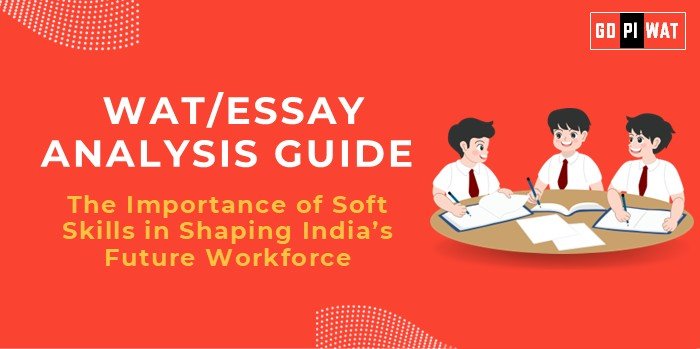📋 Written Ability Test (WAT)/Essay Analysis Guide
🌟 The Importance of Soft Skills in Shaping India’s Future Workforce
🌐 Understanding the Topic’s Importance
Soft skills are the linchpin for bridging technical expertise with leadership, innovation, and global collaboration.
They hold significant relevance for B-school aspirants, particularly for roles in HR, marketing, and consulting.
Emphasizing soft skills ensures that India’s demographic dividend translates into a globally competitive workforce.
📝 Effective Planning and Writing
- Time Allocation: Planning (5 mins), Writing (20 mins), Review (5 mins).
- Preparation Tips:
- Research trends on employability gaps and corporate soft skills training initiatives.
- Cite studies like LinkedIn’s Future of Work Report or India Skills Report.
- Highlight role models excelling in soft skills, such as Sundar Pichai or Indra Nooyi.
✍️ Introduction Techniques
- Contrast Approach:
“While India boasts the largest pool of engineers, a persistent lack of communication skills hampers their global competitiveness.” - Solution-Based Approach:
“India’s demographic dividend can be maximized by embedding soft skills into academic and professional spheres.”
📖 Structuring the Essay Body
- Achievements:
- Government initiatives like NEP 2020 focus on holistic education.
- Corporate programs, such as Infosys’ soft skills training, enhance workforce employability.
- Challenges:
- Systemic issues like rote learning in education hinder interpersonal skill development.
- Urban-rural divides limit access to skill development programs.
- Future Outlook:
- Introduce public-private partnerships to scale skill-building initiatives.
- Integrate soft skills into school and higher education curricula nationwide.
🔗 Concluding Effectively
- Balanced Conclusion:
“Integrating soft skills across education and professional training ensures India’s workforce remains relevant in a global economy.” - Global Comparison Conclusion:
“Learning from Finland’s education model and Japan’s corporate culture can help India build a more holistic workforce.”
📄 Sample Short Essays
- Balanced Perspective (100 words):
“India’s workforce, though technically skilled, faces employability challenges due to a lack of soft skills.
Corporate training programs and government initiatives have made strides, but the gaps remain significant.
Addressing this through a blend of early education reforms, vocational training, and lifelong learning programs can yield tremendous economic and social gains.” - Solution-Oriented (100 words):
“Public-private collaborations in skill development can foster a generation adept in both technical and interpersonal skills.
Programs like NEP 2020 must prioritize soft skills training alongside STEM education, and corporate stakeholders should offer scalable models of upskilling.
These steps can position India as a global talent leader, bridging the gap between technical expertise and emotional intelligence.” - Global Comparison (100 words):
“India must emulate Finland’s emphasis on early education in soft skills to unlock its workforce’s full potential.
Countries like Japan integrate teamwork and leadership principles into corporate culture, fostering adaptability.
If India integrates similar frameworks across industries and education systems, it can harness its demographic dividend to emerge as a global economic powerhouse.”


